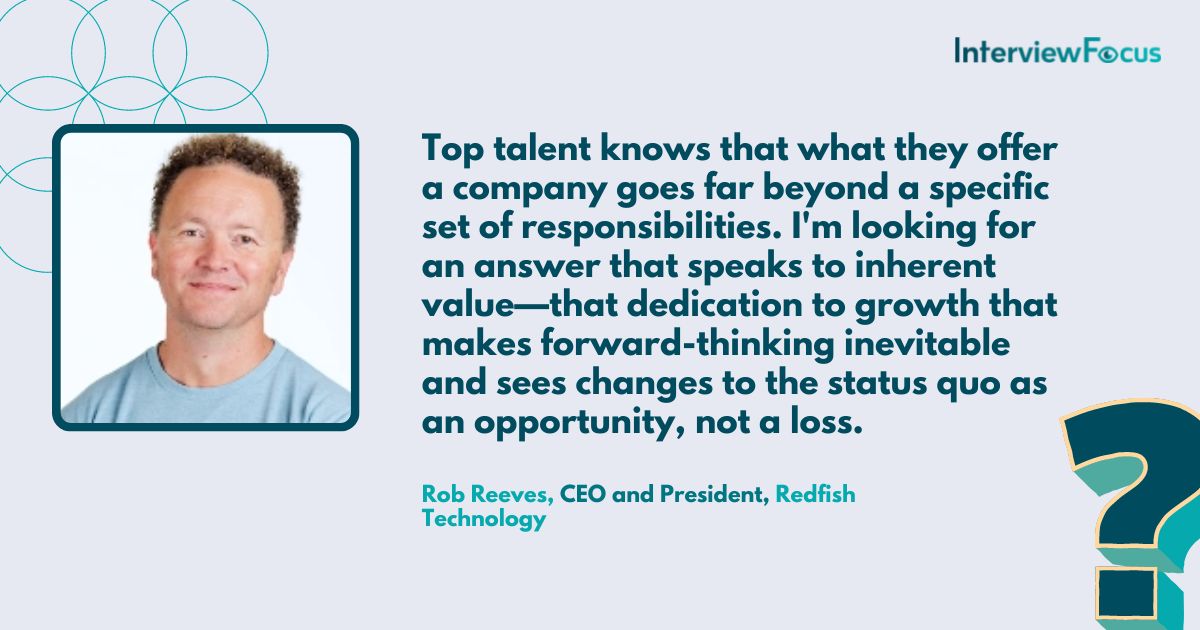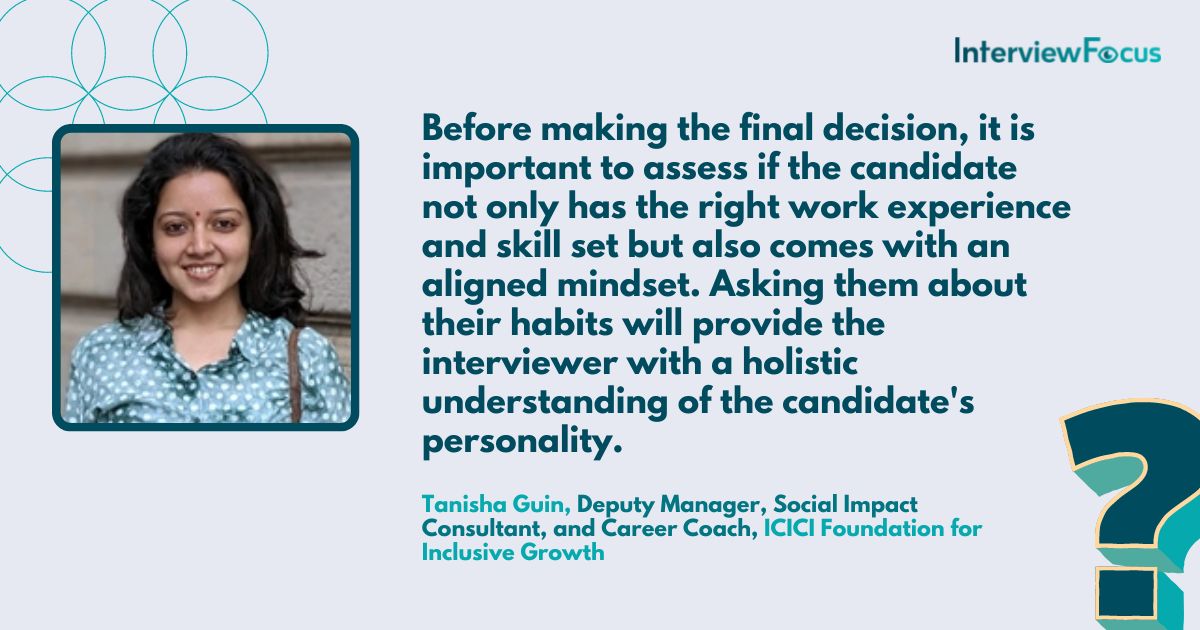What Are the Best Questions to Ask in a Final Interview?
From “What do you like about working here?” to “Is this enough money for you to walk away?,” here are 14 answers to the question, “What’s the best question to ask in a final interview?”
- What Do You Most Enjoy About Working Here?
- What is Your Turnover Rate?
- How Do You Handle Redundancy?
- What Qualities Would Make Someone Successful in This Position?
- What is the Typical Career Path for Someone in This Role?
- If I Were to Join the Team, What Advice Do You Have for Me?
- What Can I Do to Improve My Chances?
- How Do You Handle Conflicts With Colleagues or Supervisors?
- What Makes You a Good Fit for Our Culture?
- What Are Your Long-term Career Goals?
- Name Some Self-development Habits Which Help in This Role
- How Do You View Success?
- What is Your Company’s Competitive Edge?
- Is This Enough Money for You to Walk Away from the Opportunity?
What Do You Most Enjoy About Working Here?
Asking the interviewer what they enjoy most about working at the company is a great way to gain insights into the company culture, work environment, and management style. The answer to this question can also give you a sense of what makes the company unique and why employees are happy working there.
This question also serves as an opportunity to build rapport with the interviewer and show that you are genuinely interested in the company and its employees.
Joe Flanagan, Founder, 90s Fashion World
What is Your Turnover Rate?
While in previous interviews, you may have asked about what the job entails, try to get to the heart of the workplace environment in later interviews as your chances of being hired increase.
Of course, it’s always exciting to receive a job offer, but it’s also important to ensure that you can envision yourself being truly fulfilled working at this company for the long term. Knowing about the company’s turnover history will give you an idea of how happy its employees are.
Marilyn Zubak, Marketing Lead, Snif
How Do You Handle Redundancy?
As a recruiter, a big part of my job is guiding candidates through the interview process, so I think I can provide some advice to your readers. My favorite question to ask in a final interview is, “If we eliminated this job tomorrow, what would you do?”
Technology is moving faster than ever before. No position is truly safe; in fact, entire departments have been whittled down overnight thanks to a single leap forward in the software we use.
Top talent knows that what they offer a company goes far beyond a specific set of responsibilities. I’m looking for an answer that speaks to inherent value—that dedication to growth that makes forward-thinking inevitable and sees changes to the status quo as an opportunity, not a loss.
Rob Reeves, CEO and President, Redfish Technology

What Qualities Would Make Someone Successful in This Position?
This question not only shows that you have a sincere interest in the job, but it also gives you an understanding of what expectations are—so that you have more insight into whether it’s worth pursuing the role further.
Likewise, steering the conversation towards discussing future growth opportunities presents yourself as an individual with ambition who will get even better at their job over time.
Mariusz Michalowski, Community and Career Expert, Spacelift
What is the Typical Career Path for Someone in This Role?
By asking this question, you can analyze the trajectory of someone in this role. Based on the answer of the employer, you can identify what challenges you will have to face while on the job.
You can determine whether you should stay in the job for a long time or not after analyzing whether there is career advancement.
Moreover, it also expresses your interest in career growth, which is crucial. The interviewer can also understand that you are looking for a long-term role in a company, which is good for employee retention.
Saikat Ghosh, Associate Director of HR and Business, Technource
If I Were to Join the Team, What Advice Do You Have for Me?
I like this question because it
- helps to set you up for success when integrating into the company,
- if you ask a few interviewers, their answers could vary, yet still be helpful, and
- gives you further insight into the organization’s operations.
I’ve asked this question as an interviewee myself and I remember the response was “be curious.” Throughout my tenure at that particular company, I used this advice to not be afraid to share ideas, recommend different approaches to solve problems, and ask insightful questions.
Megan Dias, Career Services Coach, Parsity
What Can I Do to Improve My Chances?
If you hear the answer to this directly from the interviewer, you should definitely take advantage of that experience to learn as much as you can. They can share valuable insight into the process and how you can best navigate it as a candidate.
If you ask something like “What are small things I can do to improve my chances of being hired?” the interviewer can provide valuable insight into what they are looking for and maybe even what they are seeing from other candidates.
I would ask them this question and take notes on exactly what they say. Find out what they are looking for in these situations and do whatever they say. Even if it doesn’t help this time, it might help in the future.
Shaun Connell, Founder and CEO, Credit Building Tips
How Do You Handle Conflict With Colleagues or Supervisors?
Asking a candidate this question gives you a glimpse into how they work around professional relationships to ensure that team harmony remains intact. The candidate should show they can communicate effectively despite there being a conflict. Such a candidate can easily resolve conflicts and take constructive criticism that helps them improve their output in the long run.
Liam Liu, Co-founder and CMO, ParcelPanel
What Makes You a Good Fit for Our Culture?
By the final interview, you should already know whether the candidate can do the job itself. If you are still unsure of their basic competence, the interview process must be entirely redesigned, as this should have been determined well before the final interview.
However, culture fit is a far more elusive concept and is best reserved for the final interview itself. Naturally, even the most competent and skilled employees could become mismatched if they do not fit the organization’s culture, guaranteeing attrition down the line.
Asking the candidate why they would be a good culture fit serves many purposes. Firstly, you can see whether they have done their homework and actually understand your organization’s culture. Second, you can assess whether they believe themselves to match your culture and its values. Last, a sound answer highlights an appreciation for organizational culture fit, suggesting that they take this aspect of employee engagement seriously.
Ben Schwencke, Business Psychologist, Test Partnership
What Are Your Long-term Career Goals?
As an HR professional with years of experience, I believe that the best question to ask in a final interview is: “What are your long-term career goals, and how do you see this role contributing to them?”
This question allows the candidate to showcase their ambition and vision for their career, while also showing how they see themselves fitting into the organization and the role they are applying for. It also gives insight into the candidate’s level of commitment and dedication to their career and the company, which is important for long-term success.
This question can help the interviewer assess whether the candidate’s career goals align with the organization’s mission and vision, and whether they clearly understand how the role fits into the bigger picture. Overall, this question can provide valuable information for making a hiring decision and can help ensure a good fit for both the candidate and the organization.
Ben Basic, CMO, Get It Cleaned
Name Some Self-development Habits Which Help in This Role
Before making the final decision, it is important to assess if the candidate not only has the right work experience and skill set but also comes with an aligned mindset. Asking them about their habits will provide the interviewer with a holistic understanding of the candidate’s personality.
We, as professionals, are well aware of how positive habits lead to efficient work management and ensure that most of our time at work is spent productively. This question will give the interviewer a chance to have a candid conversation and understand the candidate better to come to an informed decision.
As an interviewee, when answering this question, talk about the habits that are most relevant to the job on offer. Also, do not forget to share a relevant example of how this habit helped you excel.
Tanisha Guin, Deputy Manager, Social Impact Consultant, and Career Coach, ICICI Foundation

How Do You View Success?
The best question to ask in a final interview is one that gives insight into how the individual thinks about their career and the company. A common example of this would be asking what motivates them professionally, as it speaks volumes about their willingness to take initiative and how they view success from a macro perspective.
This type of question allows hiring managers to measure self-motivated candidates who are driven by intangible goals such as developing their skill set, utilizing personal strengths, and seeing their hard work pay off.
Julia Kelly, Managing Partner, Rigits
What is Your Company’s Competitive Edge?
I chose the question “What sets the company apart from its competitors, and how do you ensure that the company stays competitive?” as the best question to ask in a final interview because it shows that the candidate is interested in understanding the company’s unique selling proposition, and how they plan to maintain their competitive edge in the market. It also shows that the candidate is strategic and forward-thinking, as they are seeking information about the company’s long-term plans for success.
When answering this question, it’s important to highlight specific aspects of the company’s products, services, or culture that set it apart from competitors, and provide examples of how the company has innovated to maintain its position in the market.
Ben Lau, Founder, Featured
Is This Enough Money for You to Walk Away from the Opportunity?
Place a check for $1,000.00 on the table, then ask, “Is this enough money for you to walk away from the opportunity? If it is, you are free to take it.”
If they take the money, they were not truly invested in accepting the role. If they ask for more money, they were not truly invested in the role and may job-hop in the near future.
If they immediately refuse the money, chances are they know you are testing them. As such, try additional questions to confirm their commitment to the role.
If they pause, think, and refuse the money, consider hiring them. Their reaction suggests that they will delay immediate gratification for long-term profit and they likely see themselves being successful at your company.
Amazon has a “Pay to Quit” program that pays employees to quit their jobs. Incentivizing people to walk away in the final stages of a job interview could work just as well and save headaches on the backend.
Jim Stroud, Content Creator






